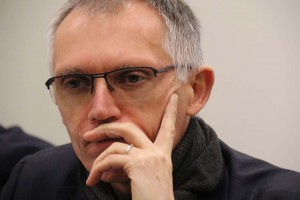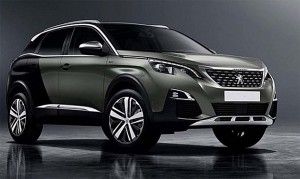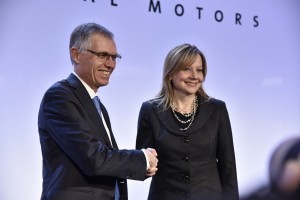
PSA CEO Carlos Tavares has been credited with turning around the near-bankrupt French company, and now making a profit at Opel in just one year.
In just about a year, PSA Group managed to do something General Motors Co. hadn’t done 20 years: squeeze a profit out of Opel. PSA bought the company as well as its British sibling Vauxhall from GM for $1.3 billion euros last year.
The German brand reported a profit of $588 million, or 502 million euros, through the first six months of this year compared with a loss last year.
The profits excluded $492 million, or 406 million euros, in one-time charges, after the company reached an agreement in May with German labor representatives to eliminate 3,700 jobs from Opel’s German workforce of about 20,000 employees.
“We’re seeing the first signs of this successful turnaround,” PSA CEO Carlos Tavares, once the No. 2 man behind Carlos Ghosn at Renault SA, told Bloomberg TV. “Each employee is contributing and I’m very happy to see the results with all of our stakeholders.”
(Trump tariffs could complicate PSA’s return to U.S. market. Click Here for the story.)
Tavares followed a very familiar formula in turning a profit: cutting costs wherever possible. First, he slashed the development costs on Opel models by tying them to existing Peugeot and Citroen vehicle platforms. The result is a vehicle like the new Corsa costing 20% to 50% less to bring to the market.
His miserly methods were not limited to just product development and cutting jobs, he slashed day-to-day expenses like cell phones and office equipment. It was a tried-and-true method: he used it to resurrect PSA just a few years ago.
“This is simply the quickest turnaround I have seen in the auto industry in many years,” JP Morgan analyst Jose Asumendi wrote in a note. PSA shares surged 15%, the most since 2012 and were 14% higher at 4:52 p.m. in Paris, according to Bloomberg.
(Click Here for details about GM completing the sale of Opel/Vauxhall to PSA Group.)
“Opel-Vauxhall has started to reveal its full potential for performance thanks to the strong involvement of its teams,” Chief Financial Officer Jean-Baptiste de Chatillon said on a call with the media. However, it’s not all sunshine and roses for the brand company as it faces several challenges outside of Europe.

While new Peugeot models, such as this 3008 crossover, would work for North America, PSA wants to develop unique U.S. products.
In the world’s largest market, China, the manufacturer is working to turn around its operations, continuing a slow-moving sales recovery in the first half after sales fell 37% there last year.
Additionally, PSA halted its operations in Iran – its biggest market outside France – in May to comply with U.S. sanctions, hoping for the French government to negotiate a waiver that U.S. authorities refused to grant, Bloomberg reports. Speaking of the U.S., it has been teasing a return to America for some time, including setting up a U.S. headquarters in Atlanta.
(To see more of PSA’s three-stage plan to return to the United States, Click Here.)
However, the Trump administration’s move to raise tariffs has complicated the issue. “I’m crossing my fingers” and hoping the tariffs aren’t implemented, Larry Dominique, the veteran auto executive who now serves as the U.S. president and CEO for PSA, said during a meeting with reporters at the Detroit Automotive Press Association last week. “I’m hoping by the time we start importing vehicles this won’t be an issue.”

